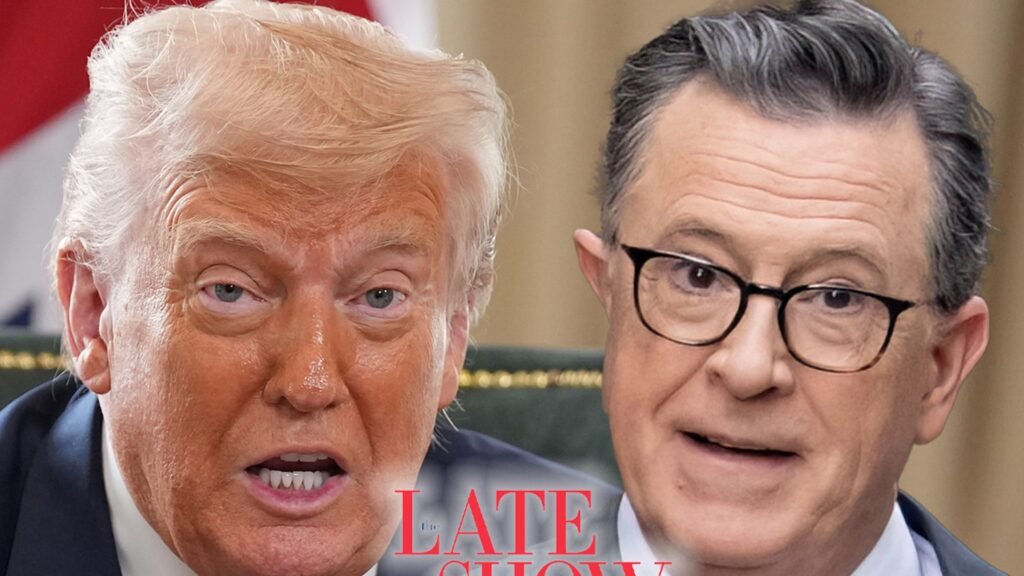Trump Reacts to Colbert’s Firing: A Perspective on Late-Night Television
In a recent statement on Truth Social, President Donald Trump addressed the controversial firing of Stephen Colbert from his late-night talk show, attributing the decision to a "pure lack of TALENT" rather than any alleged influence he might have wielded. As conversations about Colbert’s dismissal unfold, Trump emphasizes that CBS was suffering significant financial losses related to the show’s viewership, reportedly around $50 million annually. "It was only going to get WORSE," he declared, pointing fingers at not only Colbert but suggesting that other late-night hosts, such as Jimmy Kimmel and Jimmy Fallon, might soon share a similar fate.
The Fallout of Colbert’s Departure
The abrupt ending of Colbert’s tenure has generated a whirlwind of speculation and rumors. Many observers have noted the timing of the firing coincided with the pending merger between Skydance and Paramount, raising questions about possible behind-the-scenes strategic moves rooted in Trump’s unyielding rivalry with Colbert. Critics have suggested that this appears to be an illustration of Trump’s influence over networks that produce programs he feels target him adversely.
Nevertheless, Trump vehemently denied being a driving force behind Colbert’s exit, labeling the allegations as unfounded. "I’m not the scapegoat here," he declared, positioning himself not as a puppeteer pulling the strings but rather as an observer of the television landscape, which he suggests operates on a simple premise: ratings.
The Ratings Game and Audience Appeal
In Trump’s view, the business of showbiz hinges on one critical aspect: ratings. According to him, hosts who secure strong audience numbers can face less scrutiny and enjoy creative freedom, whereas those falling short find themselves in precarious situations. This premise sets the stage for his assertion that Colbert’s shortcomings as a host ultimately led to his downfall rather than any external pressures or his own rivalry.
As Trump predicts a similar fate for Kimmel and Fallon, he underscores the harsh realities of the entertainment industry, where financial viability must coincide with talent. The expectation is clear: without high ratings, even the most popular figures can swiftly become liabilities rather than assets.
The Role of Criticism in Comedy
For decades, late-night television has served as a platform for political satire and criticism. The dynamic between politicians and comedians has often been contentious, with figures like Colbert often making sharp jabs at Trump and his administration. This antagonistic relationship unfolds in a landscape where ratings and viewership are frequently dictated by how effectively hosts engage with current political events and public sentiment.
This raises an intriguing question: Does the political climate influence the sustainability of late-night shows? Trump’s comments imply that while strong political satire can win audiences, the moment a host’s talent is perceived to be lacking, their relevance quickly fades, making room for new contenders in the genre.
Future of Late-Night Television
Given the current state of late-night television, the future is uncertain but ripe for change. With Colbert’s exit and potential shifts impacting Kimmel and Fallon, the landscape may witness the rise of fresh talent over familiar faces. As Trump hinted at an impending transformation in the late-night realm, audiences await to see if new shows with a different energy will emerge, challenging the stagnant norms of the genre.
Final Thoughts
Trump’s reaction to Colbert’s dismissal serves as a broader commentary on talent, ratings, and the ever-evolving dynamics of late-night television. With the entertainment industry facing transformative changes, the landscape reflects the delicate balance between credibility and audience engagement. As the dust settles from Colbert’s firing, it remains essential to consider how the industry adapts to market demands while navigating the complexities of political commentary and viewer expectations. The future of late-night may hold fresh perspectives, but only time will reveal which hosts will endure in a landscape defined by cutthroat competition and shifting allegiances.





